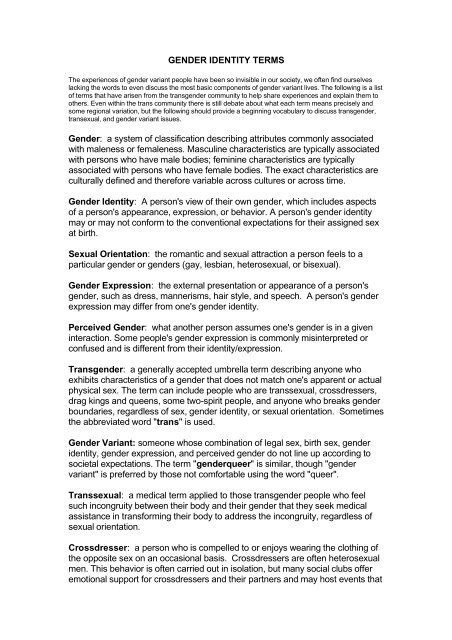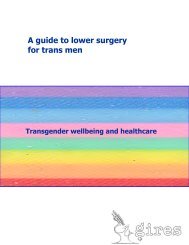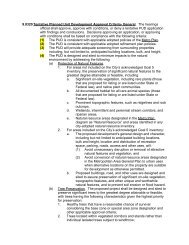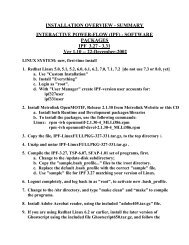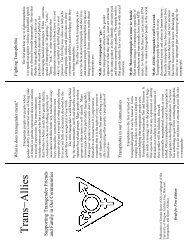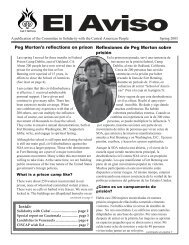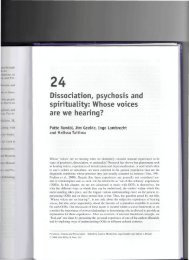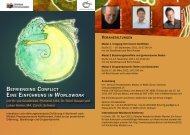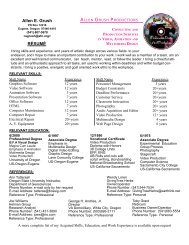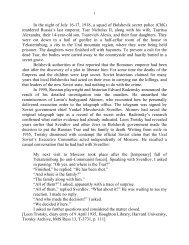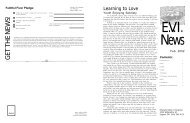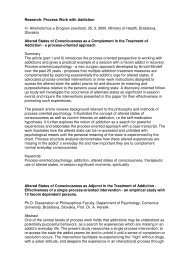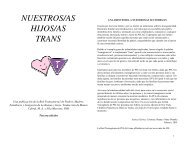GENDER IDENTITY TERMS Gender: a system of ... - Members.efn.org
GENDER IDENTITY TERMS Gender: a system of ... - Members.efn.org
GENDER IDENTITY TERMS Gender: a system of ... - Members.efn.org
Create successful ePaper yourself
Turn your PDF publications into a flip-book with our unique Google optimized e-Paper software.
<strong>GENDER</strong> <strong>IDENTITY</strong> <strong>TERMS</strong><br />
The experiences <strong>of</strong> gender variant people have been so invisible in our society, we <strong>of</strong>ten find ourselves<br />
lacking the words to even discuss the most basic components <strong>of</strong> gender variant lives. The following is a list<br />
<strong>of</strong> terms that have arisen from the transgender community to help share experiences and explain them to<br />
others. Even within the trans community there is still debate about what each term means precisely and<br />
some regional variation, but the following should provide a beginning vocabulary to discuss transgender,<br />
transexual, and gender variant issues.<br />
<strong>Gender</strong>: a <strong>system</strong> <strong>of</strong> classification describing attributes commonly associated<br />
with maleness or femaleness. Masculine characteristics are typically associated<br />
with persons who have male bodies; feminine characteristics are typically<br />
associated with persons who have female bodies. The exact characteristics are<br />
culturally defined and therefore variable across cultures or across time.<br />
<strong>Gender</strong> Identity: A person's view <strong>of</strong> their own gender, which includes aspects<br />
<strong>of</strong> a person's appearance, expression, or behavior. A person's gender identity<br />
may or may not conform to the conventional expectations for their assigned sex<br />
at birth.<br />
Sexual Orientation: the romantic and sexual attraction a person feels to a<br />
particular gender or genders (gay, lesbian, heterosexual, or bisexual).<br />
<strong>Gender</strong> Expression: the external presentation or appearance <strong>of</strong> a person's<br />
gender, such as dress, mannerisms, hair style, and speech. A person's gender<br />
expression may differ from one's gender identity.<br />
Perceived <strong>Gender</strong>: what another person assumes one's gender is in a given<br />
interaction. Some people's gender expression is commonly misinterpreted or<br />
confused and is different from their identity/expression.<br />
Transgender: a generally accepted umbrella term describing anyone who<br />
exhibits characteristics <strong>of</strong> a gender that does not match one's apparent or actual<br />
physical sex. The term can include people who are transsexual, crossdressers,<br />
drag kings and queens, some two-spirit people, and anyone who breaks gender<br />
boundaries, regardless <strong>of</strong> sex, gender identity, or sexual orientation. Sometimes<br />
the abbreviated word "trans" is used.<br />
<strong>Gender</strong> Variant: someone whose combination <strong>of</strong> legal sex, birth sex, gender<br />
identity, gender expression, and perceived gender do not line up according to<br />
societal expectations. The term "genderqueer" is similar, though "gender<br />
variant" is preferred by those not comfortable using the word "queer".<br />
Transsexual: a medical term applied to those transgender people who feel<br />
such incongruity between their body and their gender that they seek medical<br />
assistance in transforming their body to address the incongruity, regardless <strong>of</strong><br />
sexual orientation.<br />
Crossdresser: a person who is compelled to or enjoys wearing the clothing <strong>of</strong><br />
the opposite sex on an occasional basis. Crossdressers are <strong>of</strong>ten heterosexual<br />
men. This behavior is <strong>of</strong>ten carried out in isolation, but many social clubs <strong>of</strong>fer<br />
emotional support for crossdressers and their partners and may host events that
provide an opportunity for people to socialize while experiencing the role <strong>of</strong> the<br />
opposite sex. The term "transvestite" has also been used, but is sometimes<br />
considered <strong>of</strong>fensive.<br />
Drag Queen and Drag King: one who crossdresses, usually for<br />
performance/entertainment. This term is used more frequently in lesbian-gaybisexual<br />
communities.<br />
Two-Spirit: A term used by some members <strong>of</strong> Native American and First<br />
Nations communities to describe someone with both male and female spirit. This<br />
can involve someone's sexual orientation, gender identity, both, or other factors<br />
-- not everyone who is two-spirit identifies as being "trans." The use <strong>of</strong> two-spirit<br />
by non-First Nations people is <strong>of</strong>ten considered <strong>of</strong>fensive.<br />
Transgenderist: a person who lives full time in the gender <strong>of</strong> his or her choice<br />
(different from the body type) without desiring gender reassignment surgery.<br />
Some transgenderists consider themselves to be "non-operative" transsexuals.<br />
Transgenderists may or may not choose to take hormones to permanently alter<br />
their appearance.<br />
Intersex: an individual whose biological and/or genetic traits at birth do not<br />
correspond with conventional concepts <strong>of</strong> male/female anatomy. Most people<br />
choose to refer to themselves as intersex rather than hermaphrodites, and the<br />
use <strong>of</strong> the term hermaphrodite by non-intersex people is <strong>of</strong>ten considered<br />
<strong>of</strong>fensive. While some intersex people are also transgender, intersex people as<br />
a group have a unique set <strong>of</strong> needs and struggles.<br />
Transition: the process <strong>of</strong> changing one's presentation and/or expression to<br />
align with one's gender identity. Some <strong>of</strong> these changes include manner <strong>of</strong><br />
dress, name change, pronoun change, hormonal modifications, or surgery.<br />
Transition varies greatly across the transgender community, both in what people<br />
choose to change and when certain changes feel most comfortable.<br />
Standards <strong>of</strong> Care: a set <strong>of</strong> guidelines formulated by the Harry Benjamin<br />
International <strong>Gender</strong> Dysphoria Association to determine when and how<br />
transpeople may obtain hormones and sex reassignment, involving a period <strong>of</strong><br />
psychotherapy, "the Real Life Test," and, if desired, hormones and/or surgery.<br />
Only recently have The Standards <strong>of</strong> Care been rewritten with advice and<br />
counsel from actual trans persons.<br />
Hormone Replacement Therapy (HRT): the process <strong>of</strong> taking hormones to<br />
achieve the secondary sex characteristics <strong>of</strong> the desired sex.<br />
Sexual Reassignment Surgery (SRS): surgery for the purpose <strong>of</strong> having a<br />
body more consistent with one's gender identity. SRS may be quite costly, and<br />
not everyone who desires SRS has equal access. Also known as <strong>Gender</strong><br />
Reassignment Surgery (GRS).


